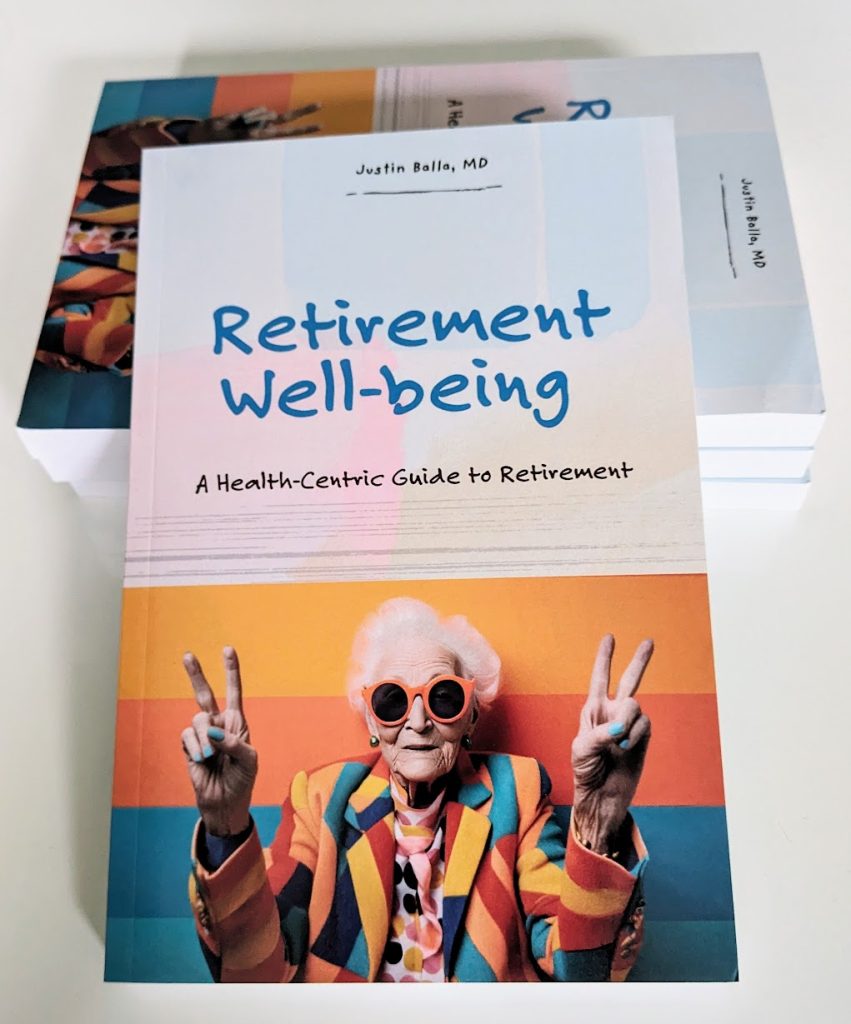Retirement Well-being

A Health-Centric Guide to Retirement


About this book
The book “Retirement Well-being: A Health-Centric Guide to Retirement” questions conventional wisdom about retirement by emphasizing the need of good health for a happy life after work. It promotes holistic well-being, which combines mental, physical, and financial wellness. It appeals to both younger and retiring generations by reimagining retirement as a period for growth and balance and by providing doable techniques. This manual is a proactive toolkit for well-informed choices, stressing a thorough approach to retirement preparation and encouraging a joyful and active retirement period.



Who is this book for
The target audience for the book “Retirement Well-being: A Health-Centric Guide to Retirement” includes both the younger generation and those who have reached or are approaching retirement. For those who are just starting out in their careers, this ground-breaking book serves as a proactive toolset advocating for early awareness and well-informed decision making. In order to emphasize the value of a comprehensive approach to retirement planning, the book lays a heavy emphasis on the connections between financial stability, mental health, and physical health. It is a rallying cry for readers to start planning early for a happy and secure retirement in order to guard against setbacks and challenges down the road. This book is like a lighthouse, showing you the way to a happy and well-rounded future, whether you are gazing ahead or counting down the days till retirement.

Book chapters
1 Foreword
Contrary to popular belief, retirement comes with a lot of difficulties that go far beyond having to figure out how to pay for costs or where to go on your next trip. The cornerstone of good health, a topic that frequently does not receive as much attention as it clearly deserves, is at the core of a meaningful retirement. “Retirement Well-being: A Health-Centric Guide to Retirement” aims to fill this gap.
2 Introduction
Retirement, for most people, marks the start of a brand-new chapter in life after many years of hard work. The concept of retirement has evolved greatly over the years, and its meaning now differs greatly from that of previous generations. Because of the changes in society and the increase in life expectancy, it is essential to plan ahead for a secure and rewarding retirement.
3 The Positive Aspects of Retirement
As one approaches the golden years of retirement, a multitude of opportunities become accessible. The most cherished aspects of retirement are the newfound independence and control over your time and options. This section emphasizes the value of control and independence in retirement and how to use them to enjoy a happy and fulfilled post-career life.
4 The Negative Aspects of Retirement
Many people anticipate their freedom in retirement, seeing it as a time for rest and self-discovery. However, the transition from a structured working life to retirement can present unanticipated challenges, many of which center on emotional and psychological changes. The loss of regularity and structure is one of the biggest changes retirees experience.
5 Being Proactive About Planning
Retirement appears as an oasis of calm amid the hectic pace of life, a time for introspection, pampering, and relaxation. It’s an oasis, a place to get away from the stress of bills and other financial commitments. However, this tranquil oasis does not appear out of thin air; rather, it is the result of careful, strategic preparation and an in-depth familiarity with one’s financial future.
6 Designing a Balanced Retirement Lifestyle
While retirement may represent the end of a chapter in one’s life and the beginning of a new one for some, it can also be a time of existential limbo for others. It is important to remember that a fulfilling retirement is about more than just filling time. But when you travel this difficult terrain of leisure and legacy with two dependable companions—passion and purpose—it can become easier and more meaningful
7 Managing Negative Impacts
Establishing new habits is crucial after retirement to give each day a sense of direction and purpose. It’s helpful to divide your day into tasks like working, unwinding, socializing, and sleeping in order to create such a schedule. This strategy mitigates the potential negative effects of retirement while also breaking up the monotony of solitude.
8 The Role of Society and Policy
Consideration must also be given to the treatment of the elderly in today’s culture. The term “ageism” refers to bigotry or discrimination against someone solely based on their chronological age. Ageism occurs when some members of society believe that the elderly are incapable of learning new information or are otherwise less useful than younger generations.
9 Getting Ready for Surprises
Life, like a roller coaster, has many twists and turns. When you’re older and no longer working, you can assume that everything is set in stone. However, life will occasionally throw you something unexpected. These are unforeseeable situations, such as being ill or finding that you must relocate. The good news is that you can learn to deal with unexpected events.
10 Life Stories
In this chapter, we look at the stories of real retirees whose decisions to retire had a big impact on their lives. By speaking with retirees in depth, we can learn a lot about how they have adjusted to their newfound independence and responsibilities in their golden years. These accounts give insight into the various retirement paths available.
11 Conclusion
At the end of the book, this chapter provides a brief overview of its key points. Anyone who is thinking about or has already retired will greatly benefit from these life lessons.
12 Resources
We’ve collected a short selection of useful websites to aid in this major life change. From personal finance and health advice to community building and ongoing education, these resources cover it all. Each tool is a steppingstone on the path to a happy and secure retirement.

About the author
Dr. Justin Balla is a well renowned geriatric medicine specialist who contributes significantly to the academic medical community. His interest for gerontology stemmed from his father, who had a profound impact on him and instilled in him a deep respect for the elderly and the wisdom they possessed.
Dr. Balla’s medical practice benefits from his extensive and diversified education in Germany and the United States. His encounters with senior adults inspired this book because they highlighted the crucial need of proper planning in the years leading up to retirement.
Dr. Balla has traveled extensively over the world, seeing the cultures of four continents in addition to his medical practice. His exposure extended his personal and professional perspectives, and his ability to communicate in many languages improved his cross-cultural skills. Because of his experiences, he has developed a bright and intuitive personality that allows him to easily engage with people from many backgrounds.
“Don’t simply retire from something; have something to retire to.”
Harry Emerson Fosdick
(May 24, 1878 – October 5, 1969)

